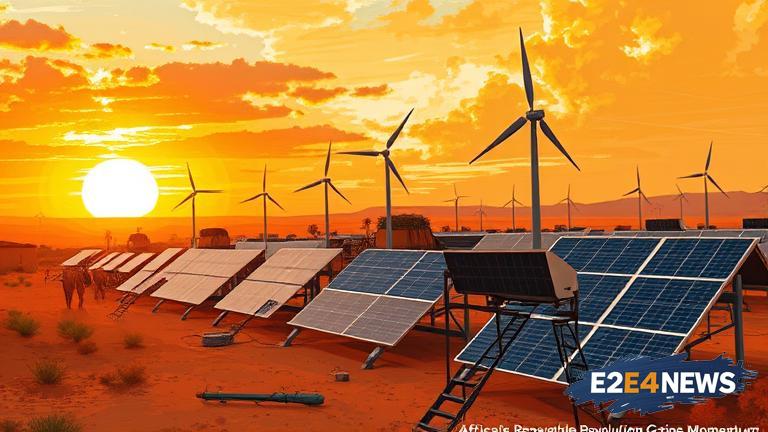The African continent is witnessing a significant shift towards renewable energy, driven by the need to address the pressing issues of energy access, climate change, and sustainable development. With many countries still struggling to provide reliable and affordable electricity to their citizens, renewable energy has emerged as a viable solution. Solar and wind power are leading the charge, with countries like South Africa, Egypt, and Morocco investing heavily in these sectors. The African Union’s ambitious goal of achieving 100% access to electricity by 2030 has further accelerated the adoption of renewable energy. Governments and private sector players are working together to develop and implement renewable energy projects, creating new opportunities for economic growth and job creation. The use of renewable energy is also expected to reduce greenhouse gas emissions, contributing to a cleaner and healthier environment. Moreover, the cost of renewable energy is decreasing, making it more competitive with fossil fuels. This trend is likely to continue, driving further investment and innovation in the sector. As the demand for energy continues to rise, African countries are exploring new ways to harness renewable energy sources, including geothermal, hydro, and biomass. The development of renewable energy infrastructure is also expected to improve energy security, reducing reliance on imported fuels and enhancing economic stability. Furthermore, the growth of renewable energy is creating new opportunities for local communities, including the development of small-scale renewable energy projects and the creation of jobs in the sector. The African Renewable Energy Initiative, launched in 2015, aims to achieve at least 300 GW of renewable energy capacity by 2030, a goal that is widely seen as ambitious but achievable. To achieve this goal, countries will need to develop and implement effective policies and regulatory frameworks, as well as attract significant investment in the sector. The private sector is expected to play a key role in driving the growth of renewable energy in Africa, with companies like Vestas, Siemens Gamesa, and Goldwind already active in the market. International cooperation and knowledge sharing will also be critical, with countries like China, the United States, and the European Union providing significant support to African countries in their transition to renewable energy. Despite the many opportunities and benefits, there are also challenges to be addressed, including the need for significant investment in infrastructure, the development of skilled workforce, and the addressing of policy and regulatory barriers. However, with the right policies and support in place, the future of renewable energy in Africa looks bright, with the potential to drive economic growth, improve energy access, and mitigate climate change. The growth of renewable energy is also expected to have a positive impact on the environment, reducing pollution and promoting sustainable development. In addition, the development of renewable energy infrastructure is expected to improve energy security, reducing reliance on imported fuels and enhancing economic stability. As the African continent continues to grow and develop, the need for reliable and sustainable energy will only continue to increase, making the transition to renewable energy a critical component of the continent’s future prosperity. The use of renewable energy is also expected to reduce the cost of energy, making it more affordable for households and businesses, and promoting economic development. Overall, the future of renewable energy in Africa is promising, with the potential to drive economic growth, improve energy access, and promote sustainable development.
